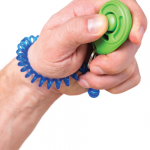Although my patient had safely performed this job for more than twenty years, a new supervisor, afraid of the liability potential if my patient should fall from a ladder and shatter his spine, fired him. Given his physical condition, my patient could not find another job and reluctantly we put him on disability. My patient was bereft. He wanted to stock hardware, not fish for bass, and there was no gain for him.
There are also patients in terrible jobs who would rather sacrifice the usual benefits of work to avoid the stress, misery, or danger of their current job. For these patients, the “gains” reflect resignation and capitulation as much as anything else.
I had an uncertain approach to disability until I attended a lecture by a psychiatrist who researched chronic pain. I have listened to thousands of lectures in my career and dutifully record the CME hours for licensing and credentialing purposes. The evaluation forms for CME programs include questions inquiring whether the lecture was relevant to your practice and would influence the way you treat patients. To be nice to the lecturers and purveyors of CME, I usually put down a “3” or “4” out of “5” on the question about the influence on my treatment. In reality, it is unusual that I learn anything that will really alter what I do. The treatment of many conditions is relatively set and there are an increasing number of guidelines to provide a schema for care. Hearing a really new way of thinking about care is unusual.
The lecture by the psychiatrist was different. His ideas really changed my view because he questioned the concept of secondary gain, advocating a different language or idiom for the people seeking disability. To this scholar, some of the people seeking disability for “secondary gain” were actually experiencing a secondary loss. The sources of the loss were many: loss of pride and self-esteem, loss of human contact and engagement, and loss of tangible accomplishment and achievement. As the psychiatrist said, even with a regular check from the government, sitting at home can be an isolating and boring existence.
In this view, some patients who seek disability in the absence of physical limitation may have emotional limitation, with the request not to work emblematic of underlying psychological or characterologic disturbance. To the psychiatrist, the request for disability could be a symptom, a signal for help. While the idea of secondary gain can call forth resentment and derision, the idea of secondary loss calls forth sympathy and understanding.
And Not Everyone Loses
Having assimilated this viewpoint, I began to shift not only my practice but also my teaching. When one of the fellows evaluating a patient for disability would glibly say that the goal was secondary gain, I would challenge him, “Where is the gain?” The fellow would usually say, “The patient doesn’t have to work,” to which I would reply, “Would you exchange your job for a life on disability?” So far, no one has said “yes.”
